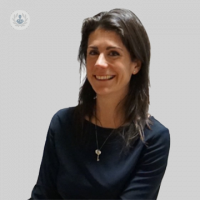Breast reduction surgery (Part 1): Am I a candidate?
Written by:Breast reduction surgery, also known as reduction mammaplasty, is a surgical procedure that removes fat, glandular tissue and skin from the breasts, achieving breasts that are lifted, smaller in size, and more in proportion with the rest of the body.
Ms Zoe Barber is a renowned consultant oncoplastic breast surgeon in Cardiff who specialises in the full spectrum of breast surgery. In the first of a two-part series of articles on breast reduction surgery, Ms Barber offers a comprehensive insight into the reasons for choosing the operation and how a patient’s candidacy is assessed.

What are the common reasons why patients seek breast reduction surgery?
There are many reasons as to why women may wish to consider a breast reduction.
Often, women who have large breasts develop their breasts at a relatively young age, and thus, spend their teenage years with disproportionately large breasts feeling embarrassed, encumbered or uncomfortable about their breasts.
In addition, many women experience physical difficulties with having larger breasts. This can be back pain, shoulder pain, grooves in their shoulders from where the bra sits, or neck pain particularly if they have a job that involves sitting or standing up for long hours of the day.
Some women who have large breasts also get skin changes in the folds underneath their breasts, and they can also get painful and uncomfortable fungal infections that make wearing a well-fitted bra difficult.
Lots of women who have larger breasts really struggle to exercise as well, and they frequently can't find sports bras that fit or they have to wear two sports bras when they're running.
Many women who have big breasts especially find it really difficult to find bras that fit, and thus, have to buy specialist bras online. A lot of women also struggle to find clothes, such as dresses or shirts, that are able to fit their waist and cover their breasts at the same time.
In many cases, women who have large breasts feel that their lives are defined by their larger breasts, and they don't want to feel that way anymore.
Thus, by the time that women come to see me, breast reduction surgery is something that has been on their mind for a long time. It’s not a snap decision that is being taken lightly. Many women do a lot of research, including reading on the Internet and seeing pictures of the before and after, and thus, often have a very good idea of what breast reduction surgery involves.
However, all surgeons do things slightly differently. Hence, it’s really important that women spend time finding the right surgeon who will listen to their concerns, but also really understand what they want to achieve from their breast reduction surgery and whether or not that's possible.
How do you assess a patient's candidacy for breast reduction surgery?
When a woman comes to see me to discuss breast reduction surgery, we start off with a conversation.
I first ask what it is that she doesn't like about her breasts, how old was she when her breasts started developing, whether or not she has had any significant weight fluctuations (up or down), and whether or not her breast size has changed with those weight fluctuations. As part of the last question, I also ask whether or not her weight has been stable, for example for the last six to 12 months.
I also ask what she would like to achieve with breast reduction surgery. Is it simply smaller breasts? Is it breasts that are lifted on her chest? Would she still like breasts that are proportionate to her frame? For example, if a woman has broad shoulders and a broad back, she may not wish to have too small breasts. Still, some women like to go as small as is physically possible.
I then ask whether or not she has had children, or, whether or not she would like to have any or more children in the future. If she would like to have more children, I also ask whether or not she would like to breastfeed them in the future. This is because breastfeeding might affect the timing, the type, and the surgical technique of the operation.
It’s also really important that she tells me about her medical history, if she has an existing health condition that she’s taking regular medication for or has had serious operations for in the past, and whether or not she has had a general anaesthetic before. This is because breast reduction surgery is performed under a general anaesthetic.
Finally, I ask whether she smokes or not, because the complication risk of breast reduction surgery is much higher in women who smoke. For this reason, I always offer my patients a period of time to stop smoking before breast reduction surgery to reduce the complication risk afterwards.
Head on over to the second part of this series of articles on breast reduction surgery to find out about the different surgical techniques used in the operation, and the potential risks and complications of the procedure.
If you’re considering breast reduction surgery and you would like to consult your options with an expert, don’t hesitate to book an appointment with Ms Zoe Barber via her Top Doctors profile today.


